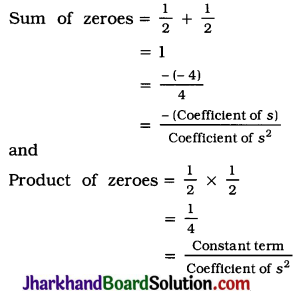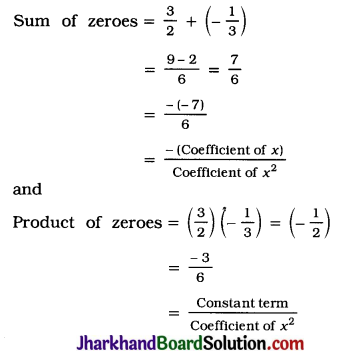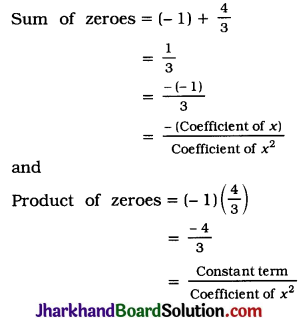Jharkhand Board JAC Class 10 Maths Solutions Chapter 2 Polynomials Ex 2.2 Textbook Exercise Questions and Answers.
JAC Board Class 10 Maths Solutions Chapter 2 Polynomials Exercise 2.2
Question 1.
Find the zeroes of the following quadratic polynomials and verify the relationship between the zeroes and the coefficients :
1. x2 – 2x – 8
2. 4s2 – 4s + 1
3. 6x2 – 3 – 7x
4. 4u2 + 8u
5. t2 – 15
6. 3x2 – x – 4
Solution:
1. x2 – 2x – 8 = x2 – 4x + 2x – 8
= x(x – 4) + 2(x – 4)
= (x – 4)(x + 2)
So, the value of x2 – 2x – 8 is zero, when
x – 4 = 0 or x + 2 = 0, i.e., when x = 4 or x = -2.
Hence, the zeroes of polynomial x2 – 2x – 8 are 4 and -2.
Now,
Sum of zeroes = 4 + (-2)
= 2
= \(\frac{-(-2)}{1}\)
= \(\frac{-(\text { Coefficient of } x)}{\text { Coefficient of } x^2}\)
and Product of zeroes = (4) (-2)
= -8
= \(\frac{-8}{1}\)
= \(\frac{\text { Constant term }}{\text { Coefficient of } x^2}\)
2. 4s2 – 4s + 1 = 4s2 – 2s – 2s + 1
= 2s (2s – 1) -1 (2s – 1)
= (2s – 1)(2s – 1)
So, the value of 4s2 – 4s + 1 is zero, when \(\frac{1}{2}\) or
s = \(\frac{1}{2}\)
2s – 1 = 0 or 2s – 1 = 0, i.e., when s = 2
Hence, the zeroes of polynomial 4s2 – 4s + 1 are \(\frac{1}{2}\) and \(\frac{1}{2}\) (both equal).
Now,

3. 6x2 – 3 – 7x = 6x2 – 9x + 2x – 3
= 3x(2x – 3) + 1(2x – 3)
= (2x – 3)(3x + 1)
So, 6x2 – 3 – 7x = 0 when 2x – 3 = 0 or 3x + 1 = 0,
i.e., when x = \(\frac{3}{2}\) or x = –\(\frac{1}{3}\).
Hence, the zeroes of polynomial 6x2 – 3 – 7x are \(\frac{3}{2}\) and –\(\frac{1}{3}\).
Now,

4. 4u2 + 8u = 4u (u + 2)
So, 4u2 + 8u = 0 when 4u = 0 or u + 2 = 0,
i.e., when u = 0 or u = -2.
Hence, the zeroes of polynomial 4u2 + 8u are 0 and -2.
Now,
Sum of zeroes = 0 + (-2)
= -2
= \(\frac{-(8)}{4}\)
= \(\frac{-(\text { Coefficient of } u)}{\text { Coefficient of } u^2}\)
and
Product of zeroes = (0)(-2) = 0
= \(\frac{0}{4}\)
= \(\frac{\text { Constant term }}{\text { Coefficient of } u^2}\)
Note: In polynomial
4u2 + 8u = 4u2 + 8u + 0, the constant term is 0.
5. t2 – 15 = (t)2 – (\(\sqrt{15}\))2
= (t + \(\sqrt{15}\)) (t – \(\sqrt{15}\))
So, t2 – 15 = 0 when t + \(\sqrt{15}\) = 0 or
t – 15 = 0, i.e., when t = –\(\sqrt{15}\) or t = \(\sqrt{15}\).
Hence, the zeroes of polynomial t2 – 15 are –\(\sqrt{15}\) and \(\sqrt{15}\).
Now,
Sum of zeroes = (\(-\sqrt{15}\)) + (\(\sqrt{15}\))
= 0
= \(\frac{-0}{1}\)
= \(\frac{-(\text { Coefficient of } t)}{\text { Coefficient of } t^2}\)
and
Product of zeroes = (\(\sqrt{15}\)) (\(\sqrt{15}\))
= -15
= \(\frac{-15}{1}\)
= \(\frac{\text { Constant term }}{\text { Coefficient of } t^2}\)
Note: In polynomial t2 – 15 = t2 + 0t – 15, the coefficient of t is 0.
6. 3x2 – x – 4 = 3x2 + 3x – 4x – 4
= 3x(x + 1) – 4(x + 1)
= (x + 1)(3x – 4)
So, 3x2 – x – 4 = 0 when x + 1 = 0 or 3x – 4 = 0, i.e., when x = -1 or x = \(\frac{4}{3}\)
Hence. -1 and \(\frac{4}{3}\) are the zeroes of polynomial 3x2 – x – 4.
Now,

![]()
Question 2.
Find a quadratic polynomial each with the given numbers as the sum and product of its zeroes respectively:
1. \(\frac{1}{4}\), -1
2. \(\sqrt{2}\), \(\frac{1}{3}\)
3. 0, \(\sqrt{5}\)
4. 1, 1
5. \(-\frac{1}{4}, \frac{1}{4}\)
6. 4, 1
Solution:
1. \(\frac{1}{4}\), -1
Let the quadratic polynomial be ax2 + bx + c and its zeroes be α and β.
Then, as per given,
α + β = \(\frac{1}{4}\) = \(\frac{-b}{a}\)
and αβ = -1 = \(\frac{c}{a}\)
If a = 4, then b = -1 and c = -4.
So, one quadratic polynomial satisfying the given condition is 4x2 – x – 4.
In general, a quadratic polynomial satisfying the given condition is k(4x2 – x – 4), where k is a non-zero real number.
2. \(\sqrt{2}\), \(\frac{1}{3}\)
Let the quadratic polynomial be ax2 + bx + c and its zeroes be α and β.
Then, as per given,
α + β = \(\sqrt{2}\) = \(\frac{-b}{a}\)
and αβ = \(\frac{1}{3}\) = \(\frac{c}{a}\)
If a = 3, then b = -3\(\sqrt{2}\) and c = 1
So, one quadratic polynomial satisfying the given condition is 3x2 – 3\(\sqrt{2}\)x + 1.
In general, a quadratic polynomial satisfying the given condition is k(3x2 – 3\(\sqrt{2}\)x + 1).
where k is a non-zero real number.
3. 0, \(\sqrt{5}\)
Let the quadratic polynomial be ax2 + bx + c and its zeroes be α and β.
Then, as per given, α + β = 0 = \(\frac{-b}{a}\)
and αβ = \(\sqrt{5}\) = \(\frac{c}{a}\)
If a = 1, then b = 0 and c = \(\sqrt{5}\).
So, one quadratic polynomial satisfying the given condition is x2 + \(\sqrt{5}\).
In general, a quadratic polynomial satisfying the given condition is k(x2 + \(\sqrt{5}\)), where k is a non-zero real number.
4. 1, 1
Let the quadratic polynomial be ax2 + bx + c and its zeroes be α and β.
Then, as per given.
α + β = 1 = \(\frac{-b}{a}\)
and αβ = 1 = \(\frac{c}{a}\)
If a = 1, then b = -1 and c = 1.
So, one quadratic polynomial satisfying the given condition is x2 – x + 1.
In general, a quadratic polynomial satisfying the given condition is k(x2 – x + 1), where k is a non-zero real number.
5. \(-\frac{1}{4}, \frac{1}{4}\)
Let the quadratic polynomial be ax2 + bx + c and its zeroes be α and β.
Then, as per given,
α + β = \(-\frac{1}{4}\) = \(\frac{-b}{a}\)
and αβ = \(\frac{1}{4}\) = \(\frac{c}{a}\)
If a = 4, then b = 1 and c = 1.
So, one quadratic polynomial satisfying the given condition is 4x2 + x + 1.
In general, a quadratic polynomial satisfying the given condition is k(4x2 + x + 1), where k is a non-zero real number.
6. 4, 1
Let the quadratic polynomial be ax2 + bx + c and its zeroes be α and β.
Then, as per given.
α + β = 4 = \(\frac{-b}{a}\)
and αβ = 1 = \(\frac{c}{a}\)
If a = 1, then b = -4 and c = 1.
So, one quadratic polynomial satisfying the given condition is x2 – 4x + 1.
In general, a quadratic polynomial satisfying the given condition is k(x2 – 4x + 1), where k is a non-zero real number.